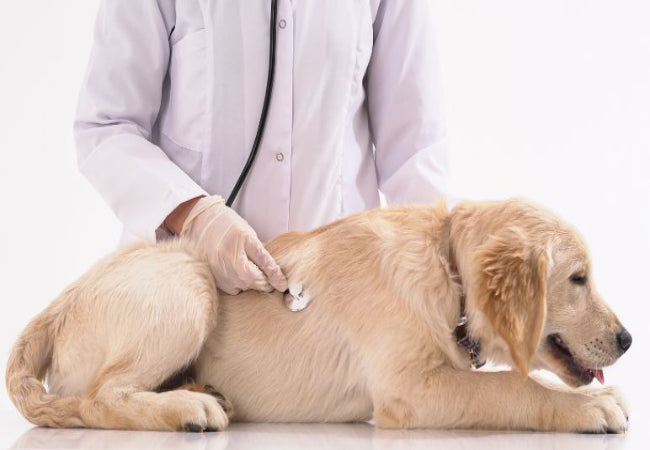Gut to Brain: How Digestive Health Affects Your Pet’s Mood 🐶✨

In this article
Gut to Brain: How Digestive Health Affects Your Pet’s Mood 🐶✨
By Dr. Duncan Houston BVSc
When I see a dog pacing anxiously or a cat suddenly withdrawn, I ask: “What’s going on in that tummy?” Because the science shows—your pet’s gut health has a profound impact on their brain and behavior.
The gut–brain axis is a powerful two-way communication network between the digestive system and the central nervous system. In pets (just like humans), an unhealthy gut can lead to anxiety, aggression, cognitive problems—even seizures. Conversely, mental stress can worsen digestive issues.
In this article, I’ll explain:
- How the gut–brain axis works in dogs, cats, and exotic pets
- Signs that GI issues are manifesting as behavior changes
- How probiotics, diet, and the Ask A Vet app can help restore balance
🧠 Understanding the Gut–Brain Axis
The gut–brain axis refers to the constant communication between the gastrointestinal (GI) tract and the brain via:
- The vagus nerve
- The endocrine system (like the hypothalamic–pituitary–adrenal axis)
- The immune system and cytokines
- Microbial metabolites—especially short-chain fatty acids (SCFAs) like butyrate
- Neurotransmitters (serotonin, dopamine, GABA) produced by gut bacteria
In pets, gut-brain signaling influences mood, anxiety, learning, memory, even seizure thresholds.
🐶 How Digestive Imbalance Affects Dogs
Dogs with GI dysbiosis often show:
- Anxiety, hypervigilance, excessive barking, lip licking, pacing
- Aggression or irritability tied to pain or inflammation
- Seizure activity linked to epilepsy and gut health
- Cognitive decline and learning issues in senior dogs
In one Beagle study, older dogs showed changes in fecal SCFAs, gut microbiome composition, and activity, tying digestive shifts to behavior.
🐱 The Feline Connection
Cats also feel their gut. Common signs of gut-brain interaction in cats:
- Increased anxiety, withdrawn behavior, and aggression
- Reduced learning or response to enrichment activities
- Digestive ups and downs cause stress and feline behavioral issues
Chronic GI inflammation releases cytokines that cross the blood-brain barrier, affecting mood and pet behavior.
🧠 Why This Matters for Pet Owners
The connection isn’t guesswork—it’s science:
- Probiotics like Bifidobacterium reduce anxiety, lower cortisol, and ease nervous behaviors.
- Microbiome-targeted therapies, including FMT (fecal microbiota transplants), are emerging treatments for behavioral disorders.
- Dietary omega‑3s and antioxidants support gut health, cognition, especially in senior pets.
- Tracking gut and behavioral symptoms improves early detection and care.
🔍 Signs You Can’t Ignore
Watch for combinations of GI and behavioral symptoms, such as:
- Soft stool or diarrhea plus anxiety or restlessness
- Vomiting and reduced play or training responsiveness
- Sudden aggression with GI discomfort during elimination
- Reduced appetite accompanied by pacing or whining
If you see these patterns, it’s not “just a gut issue”—it could be a gut-brain signal that needs vet attention.
Track these symptoms using the Ask A Vet app: GI logs, behavior notes, food changes, mood shifts—all timestamped for accurate diagnosis.
✅ Solutions That Work (and Support Your Behavior Goal)
1. Probiotics & Prebiotics
Strains like Enterococcus faecium, Lactobacillus, and Bifidobacterium help restore gut balance, calm behavior, and support immunity.
Add them via supplements or choose high-quality foods with pre/probiotics. Log results in the app.
2. Diet Rich in Fiber & Omega‑3s
High-fiber diets feed beneficial microbes; omega‑3s support cognition and anti-inflammatory pathways.
3. Stress Management & Enrichment
Balanced gut supports reduced stress—but behavior also affects gut health. Use Purrz scratchers, toys, cozy caves to reduce anxiety in cats; Woopf play toys and walks for dogs.
4. Ask A Vet App: Your Gut–Brain Tracker
- Log symptoms and behavior in one platform
- Upload videos/photos—like pacing or vomiting episodes
- Get vet feedback: Is that GI upset causing the aggression?
- Track responses to interventions like diet changes or supplements
🐾 Real-Life Case: “Bella’s Behavior Breakthrough”
Bella, my 6‑year‑old Cocker Spaniel, suffered from sporadic diarrhea and a sudden fear of thunderstorms. Logs in Ask A Vet showed a pattern—after turkey day meals, she’d get GI upset and then pace anxiously.
- We introduced a canine probiotic—Enterococcus faecium
- Switched her to a grain-and-additive-free diet rich in omega‑3s
- Paired with calming enrichment
- Within two weeks, GI normalized, and her anxious pacing during storms reduced by 75%
Taking a moment to track changes helped us treat the problem—not just the symptoms.
🧑⚕️ Final Thoughts from Dr Duncan Houston
Your pet’s gut is more than a food processor—it’s a communication hub that affects their mood, behavior, and brain. If you’re seeing worry, aggression, restlessness, or behavior decline, don’t just treat the symptom … ask:
Could this be a gut-brain issue?
Use the Ask A Vet app to track GI + behavior together. Pair diet, probiotics, stress reduction, and you’ll be managing your pet’s emotional and digestive health as a complete system.
Gut to brain, bark to purr—your pet is connected. Keep them balanced, and they’ll show you the difference.






